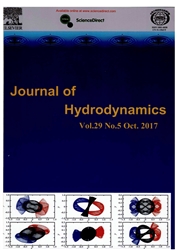

 中文摘要:
中文摘要:
A stochastic simulation of fluid flow in porous media using a complex variable expression method (SFCM) is presented in this paper. Hydraulic conductivity is considered as a random variable and is then expressed in complex variable form, the real part of which is a deterministic value and the imaginary part is a variable value. The stochastic seepage flow is simulated with the SFCM and is compared with the results calculated with the Monte Carlo stochastic finite element method. In using the Monte Carlo method to simulate the stochastic seepage flow field, the hydraulic conductivity is assumed in three different probability distributions using random sampling method. The obtained seepage flow field is examined through skewness analysis, and the skewed distribution probability density function is given. The head mode value and the head comprehensive standard deviation are used to represent the statistics of calculation results obtained by the Monte Carlo method. The stochastic seepage flow field simulated by the SFCM is confirmed to be similar to that given by the Monte Carlo method from numerical aspects. The range of coefficient of variation of hydraulic conductivity in SFCM is larger than used previously in stochastic seepage flow field simulations, and the computation time is short. The results proved that the SFCM is a convenient calculating method for solving the complex problems.
 英文摘要:
英文摘要:
A stochastic simulation of fluid flow in porous media using a complex variable expression method (SFCM) is presented in this paper. Hydraulic conductivity is considered as a random variable and is then expressed in complex variable form, the real part of which is a deterministic value and the imaginary part is a variable value. The stochastic seepage flow is simulated with the SFCM and is compared with the results calculated with the Monte Carlo stochastic finite element method. In using the Monte Carlo method to simulate the stochastic seepage flow field, the hydraulic conductivity is assumed in three different probability distributions using random sampling method. The obtained seepage flow field is examined through skewness analysis, and the skewed distribution probability density function is given. The head mode value and the head comprehensive standard deviation are used to represent the statistics of calculation results obtained by the Monte Carlo method. The stochastic seepage flow field simulated by the SFCM is confirmed to be similar to that given by the Monte Carlo method from numerical aspects. The range of coefficient of variation of hydraulic conductivity in SFCM is larger than used previously in stochastic seepage flow field simulations, and the computation time is short. The results proved that the SFCM is a convenient calculating method for solving the complex problems.
 同期刊论文项目
同期刊论文项目
 同项目期刊论文
同项目期刊论文
 Research on Hydro-Mechanical Coupling Characteristics on Soil-Structure Interface in High Earth Rock
Research on Hydro-Mechanical Coupling Characteristics on Soil-Structure Interface in High Earth Rock 期刊信息
期刊信息
